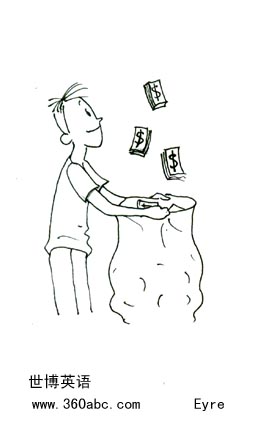
本栏目由李福兵原创编写,Eyre绘图。
朋友们可能有这样的感受:几年前买了一个手机,蛮不错。但现在早就过时了,丢掉又觉得可惜,所以暗地里想:要是哪天摔坏了就把它换掉,不用去修了。如果再花一笔钱去修,那不等于把钱打水漂了吗?看看下面的英文是怎样描述的:
The mobile telephone is too old. Paying to fix only lets you pour money down the drain.
(译文:这个手机太旧了。花钱去修只会使你把钱付诸流水。)
人们常说“钱打水漂了,”这里pour money down the drain表达的就是这个意思。股市有风险,投资要谨慎。笔者的许多朋友都在炒股,可一段时间下来,钱都打了水漂,这时我们就可以用上这个片语了。从字面上看,这个片语的意思是“把钱向泼水(pour)一样泼到水沟里(drain),”这不正说明是“将钱付诸流水”了吗?这个片语主要指花冤枉钱,把钱花在不值得花的地方了。 When someone pours money down the drain, then he or her just wastes money and produces no results. 好了,再看一个例子:
In his opinion, continuing to pay rent each month for his apartment is just pouring money down the drain. Buying a condo is better than renting. At least,the rent would go toward part ownership of the property.
(译文:他认为,继续给付房屋租金就是将钱向水一样往外泼。买一个比租用划算。至少这些租金可以转入部分的房产所有权。)
俗话说萝卜白菜各有所爱,比如买衣服,这种款式我认为对你不适合,所以花钱买了它不就是付诸流水了吗?但别人却不这样认为,看下面一段对话是怎么说的。之前先复习我们曾经介绍过的片语:to each one’s own, 它的意思是“各人的喜好不同”。
A:“I don’t think your shirt and suit go together very well.”
B:“To each his own! I like the white color of the shirt and the black suit.”
(译文:
A:“我认为你的衬衫与你的西服不太适合。”
B:“各人的喜好不同嘛! 我很喜欢白色的衬衫和黑色的西服。”
这里我们看到了一个新的片语:go together,它的意思是“彼此合适;搭配协调。”从字面上我们可以得出如下结论:如果把所有的东西都能放在一起而不起冲突,不就是彼此适宜,相互搭配的意思吗?If you put something together and they look harmonious, then you can say that they go together. 注意不要把这个片语和以前讲过的片语come together 相混淆! come together是“步上轨道,一切就绪”的意思。
最后让我们来看一看另一个例子:
The single-family house and the garden go together very well. It’s so nice to live there.
(译文:这独门独院的公寓和花园很相配,是个居住的好地方。)
结束语:当把钱花在不值得的地方时,我们就可以用片语pour money down the drain来表达。 如果我们认为有些东西放在一起很合适,就可以说go together. 比如有天上街,看见一位美女,本来顿生爱慕,偷偷的斜眼瞟了一下,却见她飞身横跨路中的隔离栏杆。撕破的鲜艳的裙子里顿时露出了迷人的美腿。哎,看来,她的美貌(good looks)和他的behavior 并不go together呢!
